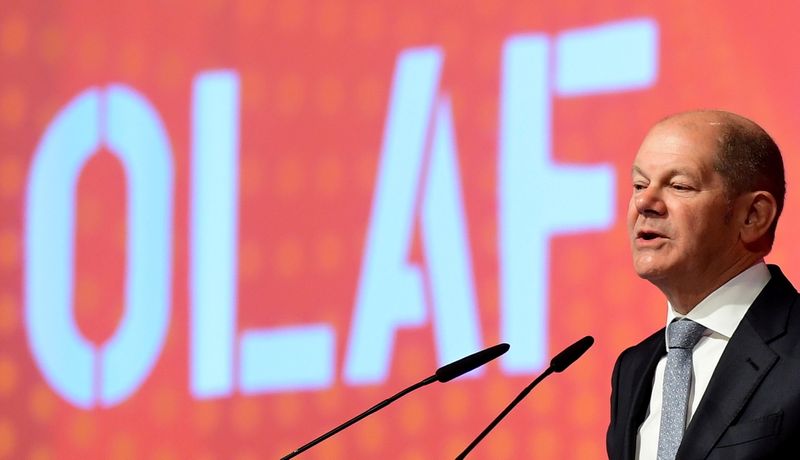By Michael Nienaber
BERLIN (Reuters) - Germany's new coalition parties agreed to create more fiscal firepower for election promises by stretching the repayment period of coronavirus debt and bolstering the government's climate investment fund with a budget manoeuvre.
The budget plans by Chancellor-in-waiting Olaf Scholz, as presented by the three parties in their joint coalition deal on Wednesday, confirmed an exclusive Reuters report from earlier this month.
The plans will allow the parties to steer clear of creating off-budget investment vehicles, which had been floated as an alternative idea to circumvent debt limits and enable more public investment to speed up the shift towards a green economy.
Scholz's centre-left Social Democrats (SPD), the Greens and the pro-business Free Democrats (FDP) face a massive spending problem as, in their coalition deal, they agreed to return to strict debt limits from 2023 and to avoid tax increases.
To create more fiscal leeway, the parties are set to use the emergency clause for the debt brake rule in the constitution for a third consecutive year and probably take on more debt than the initially planned 100 billion euros in 2022.
The three parties agreed to rework Germany's repayment plan for the coronavirus debt and align it with the less strict repayment plan of the European Union's recovery fund, according to the coalition deal.
This means that Germany's next coalition government will push back the first repayment of coronavirus debt by five years from 2023 to 2028 and stretch the repayment period from two to three decades until 2058.
This will create additional space in the federal budget of 2 billion euros per year from 2023 and nearly 10 billion euros per year from 2026 onwards, sources told Reuters.
CLIMATE FUND
The parties also agreed to super-charge the government's Climate and Transformation Fund (EKF) with "funds from already budgeted and unused credit authorizations through a supplementary budget" this year to enable additional climate protection measures and measures to transform the economy.
"The aim is to combat the consequences of the coronavirus pandemic and the simultaneous risks to the recovery of the economy and public finances caused by the global climate crisis", the parties said.
The EKF would be in charge "even more than before" of financing measures for national and international climate protection as well as for the transformation of the economy, including steps to promote climate-friendly mobility, they added.
"With the federal budget for 2022, we will examine how we can further strengthen the climate and transformation fund within the framework of the constitutional possibilities," the parties said.

Jens Suedekum, professor of economics at the Heinrich Heine University in Duesseldorf, said the budget manoeuvre would allow the ruling coalition to beef up the EKF this year and next, when the debt brake is still suspended, and then use the funds for public investments in the coming years.
A person familiar with the budget plans said that cabinet would have to pass the 2021 supplementary budget before the end of this year, but parliament could approve it at a later stage.